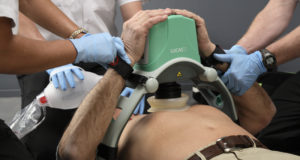American Medical Response Cuts Hours Citing Obamacare; Joins Regal Cinemas and Carl’s Jr.
Ambulance provider American Medical Response today announced that it is going to cut thousands of its EMT-Basic and EMT-Intermediate jobs from full-time 40-hour weeks and overtime to part-time status, working between 20 and 40 hours a week. COO Timothy Dorn, in a late-morning press release, stated the following to correspondents:

“…well, we can’t afford to cover them with the current mandates coming in, and with decreasing reimbursements from insurance and Medicare, we can hardly keep the doors open and the shareholders happy. I understand that this will impose hardships upon many of our employees, but our greater responsibility is to the company, and the fact of the matter is that our EMTs are entry-level employees. We’re already paying them nearly three dollars over minimum wage in most of the company- they’re not generating revenue, and they’re not educated to the same standards as our paramedics. We’ve got to make sacrifices, and we’ve agreed as a leadership team that we’re going to cut back EMT hours. They’re already working eighty-hour weeks- it’s a safety issue too.” When asked what that meant for responses, Mr. Dorn shrugged. “AMR will meet its contractual obligations through judicious use of overtime for selected employees, increased hiring of part-time EMTs to assist our paramedics and realignments of our market presence to protect AMR’s investment in high-risk markets.”
Initial analysis of the new directives indicates that the average AMR EMT-Basic can expect to see decreases in hours starting in November. Mr. Dorn’s staff indicated that would-be EMTs should prepare resumes to meet expected hiring classes across AMR’s response areas in November and December- “a nice part-time Christmas job” as one staffer confidentially stated. The average AMR EMT wage is expected to remain stable at approximately $110 per working day. Industry experts grudgingly concede that this is the first of what many expect to be a trend in ambulance services- the reduction of hours will allow many corporations to continue to reap profits even with minimal reimbursement from Medicare and shift health-care costs onto the government. “Getting rid of the employee health care takes a huge weight off in terms of costs- I think that AMR will finally be able to really invest in providing primary care with its paramedics. The profitability is enormous.” remarked one Envision junior executive, who declined to be identified. Attempts to reach AMR’s EMT union for comment were unsuccessful.
Industry competitor Rural/Metro was unavailable for comment; a recorded phone message reported that the corporate press office was disconnected.
 Call the Cops The 27th Most Trusted Site in Public Safety
Call the Cops The 27th Most Trusted Site in Public Safety





